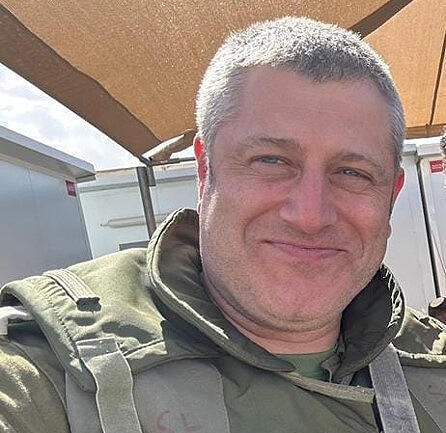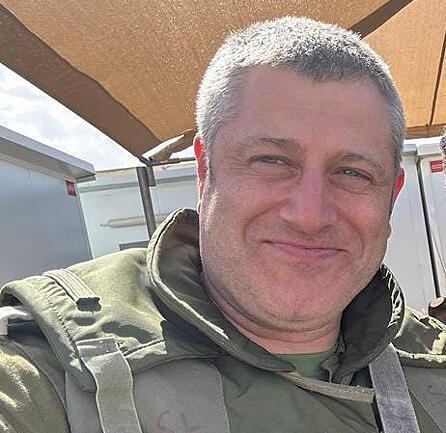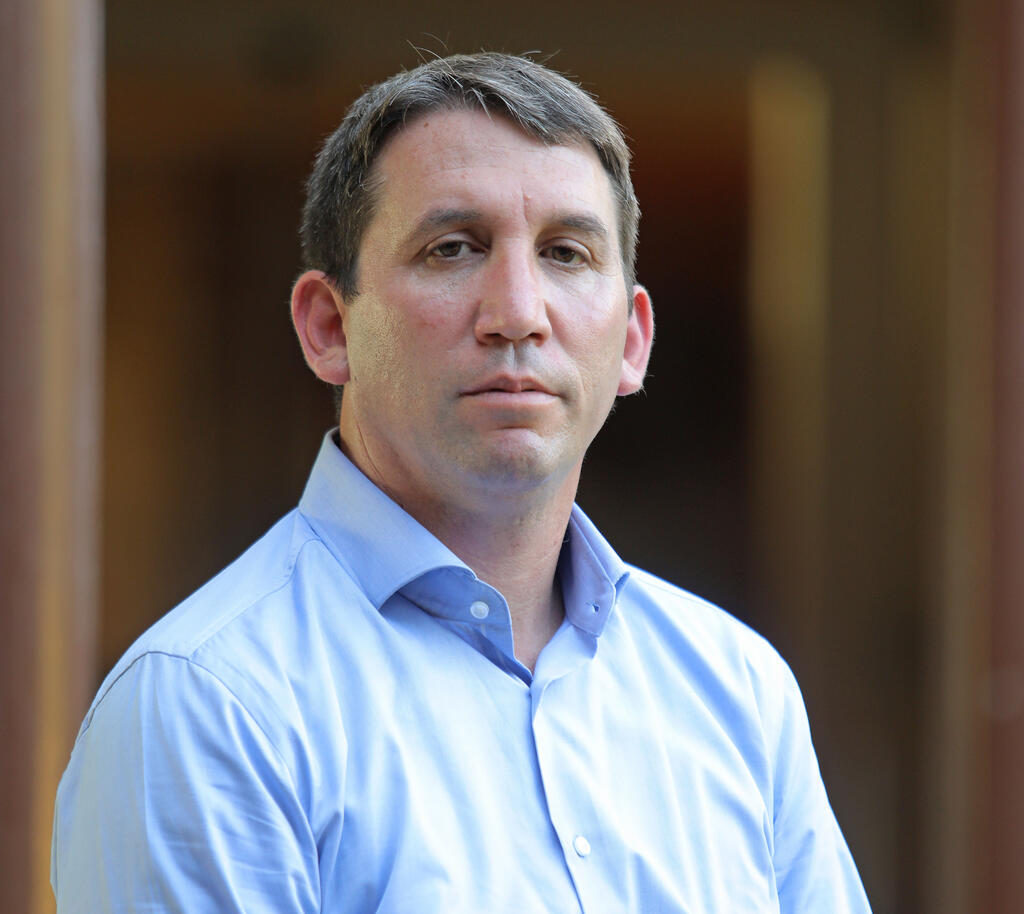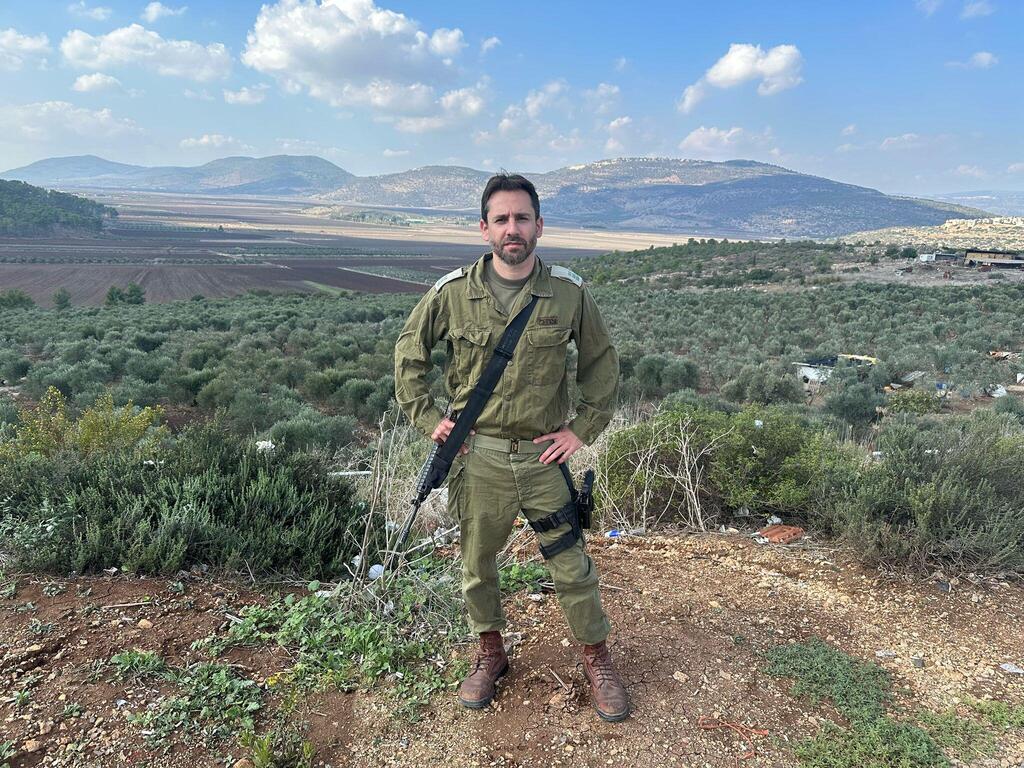
ISRAEL AT WAR
When the CEO is drafted: managing a tech company from the battlefront
Qualitest Israel Director Shai Liberman, Buff Technologies CRO Ophir Gertner, and Control CEO Guy Cabili are just a few of the senior tech managers serving in reserve units along with thousands of other high-tech employees. They spoke about how their companies continue to function in their absence
For over a month and a half, Shai Liberman, the Managing Director of Qualitest’s Israel and Eastern Europe branch, has been managing the company from an army tent. A lieutenant colonel, he was drafted as a reservist following 7/10, and for more than 40 days has been serving under the Southern Command in an artillery unit. Whenever possible, he continues to remotely lead the company, with the management team’s support.
"I have no replacement, but I do have a strong and independent team. We've built a team of professionals who excelled even during this period, taking on more responsibility so that I need to make fewer decisions. The key is not to distance oneself from the company but to operate remotely through work routines and delegated tasks," he says. Some of these routines may remain even after the war, and according to Liberman, that's not necessarily a bad thing. "It's an excellent opportunity to think about team development, roles, and responsibilities."
The COVID-19 crisis helped companies prepare for the current crisis. "The period of COVID-19 taught us an important lesson in remote management - emergency plans were devised, and we quickly put them into action. We hold regular assessment calls, meetings with other managers, and meetings with clients. Naturally, I only participate in the most critical ones, and due to my reserve duty, I sometimes have to be absent for operational needs," says Liberman.
Qualitest is a global company employing 9,000 people, with 1,500 in Israel. About 20% of the company's employees have been called up to reserve duty. "Qualitest is a global company, which sometimes requires me to attend meetings with headquarters in the United States late at night. Network reception can be challenging. I've been participating in Zoom calls from a tank for about a month, and they sometimes hear the explosions around us. They see a bit of the base in the background, the tent, or the area over Zoom, and I see the shock on their faces. They told me that only when they saw me in the field did they truly understand how severe the situation is in Israel."
Apart from explaining the situation to foreign managers, he makes a point to also communicate with Israeli employees. "Although it's remote, it's important that even if I'm not in the office, they know that I’m thinking of them and here to help them," he says.
For Buff Technologies, which developed and operates a global loyalty club platform for gamers, the challenge is even greater. About 60% of the management is in the army, including both founders, who also serve as the CEO and CRO.
"In addition to me and our CEO, about 30% of our Israeli employees are currently in the reserves, including most of the senior management. The situation creates quite complex challenges in multiple ways - maintaining human resources, workflow and function sequence, managerial continuity, adherence to processes, and many personal aspects. However, most of our operations are abroad, and we have key employees, especially in software development, who work fully abroad, so their productivity is not affected," says Ophir Gertner, the company's CRO.
Many company employees have also lost friends or family, like nearly everyone in Israel, and it cannot be expected that everyone will return to the same level of productivity. The current situation required the company to adjust, including working from home in the first month of the war, then transitioning to specific days in the office where all employees and management (as much as possible), regular Zoom team meetings, and more.
"Our company's management is strong, supportive, and knows how to fill the gaps that arise. Most of our management works in shifts, which allows more flexibility and convenience, so we manage to work. We rely on managers for support. Sometimes, managers or employees even participated in Zoom calls with partner suppliers or overseas customers while in uniform, which caused a bit of shock at first but also opened the door to more contact and shows of support. We've received phone calls and many emails expressing solidarity and wishes for our well-being, which warms the heart," Gertner says.
Senior managers take the lead
Guy Cabili, CEO of Control, which develops management tools for construction sites and has twenty employees, was called up to reserve duty at the beginning of the war as a reserve intelligence officer. "In the first two weeks after October 7, it was understandably difficult, but the company continued its operations with minimal impact. I was called up at the beginning, and our senior managers at Control took the lead. Both the Chief of Product and the Head of Success stepped up, taking over direct customer management, overseeing the work plan, and ensuring that this period passes smoothly with minimal impact on customers.
"I still try to be present, providing support and advice as needed," he says. In addition to Cabili, other employees have also been called up since the beginning of the war, but the company continues to function thanks to the remaining employees who "put in extra effort."
For a startup like Control, where the CEO and a significant number of employees are in the army, the situation is perhaps even more challenging than for a large, established company and could potentially threaten its existence.
"As part of the war, I know that economic impact is also a complex battle that we in Israel need to cope with. If an economic crisis occurs, our national resilience will be affected. The war is taken place after a challenging period for the market - lack of investment, the recession, the judicial overhaul - all have challenged companies in Israel and pushed them to the edge. We at Control understand that returning to business as usual, continued growth and routine amid the war is the objective for leaders in the business sector and its employees," he says.
'It’s almost impossible to manage employees from the army'
Avigayil Bar-Asher, Director of Product and Design at global technology company AT&T's Research and Development Center, which employs 500 workers, was called up to reserve duty to the Women's Corps in the IDF, dealing with identification of bodies and preparation for burial.
"The AT&T Development Center in Israel is responsible for developing cutting-edge technology for AT&T's products and services worldwide, so the responsibility to maintain its business continuity is significant," says Bar-Asher. "Especially in challenging times, we understand what we are truly made of, how strong we are as a team and as a company. You can see that everyone working is going above and beyond to support employees in reserve duty or those who need help in completing their tasks. Embedded processes help ensure that work continues to be done and that we meet our goals," she adds.
"It is very challenging to manage employees from the army, almost impossible, but I'm trying to balance things,” she says. “In the first few weeks, I was working at 200% – practically, mentally, and emotionally. Now it's 'only' 100%. As the manager of a large team responsible for product development and user experience for AT&T's end users globally, I think about work every day and, more than that, I think a lot about the people. Nevertheless, I give my all during reserve duty. I do it with a calm heart because I know there is an amazing team doing the work, and there is strong management holding things together and supporting me in whatever is needed. Everyone ensures that we continue to meet our tasks and goals every day. The support that I receive from my team is also a driving force that keeps me going, and it's a safety net knowing they are there and handling things even when I'm not.
“Right now, I'm trying to create a new routine where I can dedicate a few hours a week to urgent matters, and more than that, to people.” Although Bar-Asher has no official replacement, different people from the management team have taken it upon themselves to fill in for her. “The teams that I work with don't let the company feel like I’m not there,” she says.
“In the early days of the war, like the entire country, there was a slowdown in activity due to shock as we tried to understand what was happening. People were called up, attending funerals, and supporting families and friends who were affected. But very quickly, the team recovered. Some find that work helps them distance themselves a bit for a few hours from reality, and they sometimes prefer to spend more time on daily tasks just to avoid getting too immersed in the news," she says.
From shock to ‘coping through action’
Tomer Drori, Executive VP and CRM Division Manager at Elad Systems, which has 350 employees, was called up to the army on 7/10 and realized two things right away - that he would be away for a long time and his availability would be very low. He consulted with his superiors and with CEO Dagan Halevy to form a plan of action.
"Unfortunately, the division I manage at Elad suffered a great loss. We lost a dear colleague who worked in the company for the last three years, Oded Cohen, a resident of Kibbutz Be’eri, who was murdered with his mother and infant daughter, and other employees also lost close family members. However, like the entire nation, we went from shock and a sort of freeze to coping through action. As a result, a number of specific projects were born to support our customers engaged in the war effort, which led us to focus more on action than on licking our wounds and, of course, business continuity in other projects," he explains.
"On a personal level, the low availability made it very difficult for me to be involved, but fortunately the department managers and the CEO of the company have temporarily closed the gap. Of course, there are a few things waiting for after the war, but a month later, we have learned to cope with the absence of some of our key personnel serving in the reserves and to provide a business response while taking into account the emotional response our employees require. This requires a special mobilization of those who remain to fill the gaps, to do a bit more than normal."



















